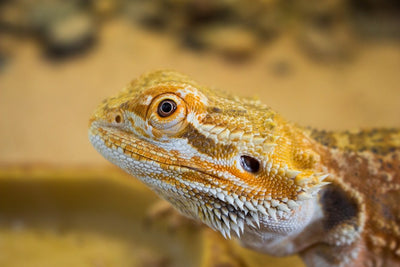Top Vegetables for Your Bearded Dragon's Diet

Bearded dragons are fascinating reptiles that require a well-rounded diet to thrive. Among the essential elements of their nutritional regimen are vegetables rich in vitamins and minerals. Feeding your bearded dragon a variety of nutritious vegetables is crucial for maintaining its health and vitality. In this guide, we will explore the top vegetables that should be included in your bearded dragon's diet, discussing their benefits and how to properly prepare them. By understanding the significance of incorporating vegetables into your pet's meals, you can ensure that your bearded dragon receives the essential nutrients needed for a long and healthy life.
Why Vegetables Are Essential for Your Bearded Dragon
Vegetables play a crucial role in the overall health and well-being of your bearded dragon. Here are some essential points to consider:.
-
Variety is Key: Explore the different types of vegetables that are safe and beneficial for your bearded dragon. A varied diet ensures they receive a wide range of nutrients.
-
Nutrient-Rich Options: Highlight specific vegetables that are rich in essential nutrients such as calcium, fiber, vitamins, and minerals. These nutrients are vital for supporting your dragon's growth and maintaining their health.
-
Hydration and Digestion: Discuss how vegetables contribute to hydration and aid in digestion for bearded dragons. Certain vegetables have high water content and fiber, which are essential for proper hydration and digestion.
-
Preventing Health Issues: Explain how incorporating vegetables into your bearded dragon's diet can help prevent health issues such as obesity, vitamin deficiencies, and digestive problems. Vegetables offer a balance to the protein-heavy diet that dragons typically consume.
-
Feeding Tips: Provide tips on how to introduce vegetables to your bearded dragon's diet gradually and ensure they are consuming the right amount for their size and age. Monitor their preferences and adjust their diet accordingly.
-
Enrichment and Mental Stimulation: In addition to the nutritional benefits, offering a variety of vegetables can provide enrichment and mental stimulation for your bearded dragon. Encouraging natural foraging behaviors through diverse vegetable offerings can enhance their overall well-being.
-
Immune System Support: Certain vegetables contain antioxidants and other compounds that can help boost your dragon's immune system, making them more resilient to illnesses and infections.
-
Dental Health: Chewing on crunchy vegetables can aid in maintaining your bearded dragon's dental health. The fibrous texture of some vegetables can help clean their teeth and prevent issues like overgrown teeth.
-
Seasonal Variations: Consider incorporating seasonal vegetables into your dragon's diet to provide a rotational variety of nutrients and flavors throughout the year.
By understanding the importance of including vegetables in your bearded dragon's diet and making informed choices about their nutrition, you can help ensure they lead a healthy and happy life.
Top Vegetables to Feed Your Bearded Dragon
Mustard Greens
Mustard greens are high in calcium and low in phosphorus, making them an excellent choice for your bearded dragon's diet. They also provide essential vitamins and minerals such as vitamin A and vitamin K. These nutrients are crucial for maintaining healthy bones and promoting proper blood clotting. To serve, chop or shred the mustard greens for easy consumption.
Bell Peppers
Bell peppers are not only colorful and flavorful but also rich in vitamin C and beta carotene, which are beneficial for your pet's immune system and overall health. Additionally, they contain antioxidants that help in fighting off free radicals. Remember to remove the seeds and slice the bell peppers into small, manageable pieces.
Squash
Squash varieties like butternut or acorn squash are excellent sources of fiber, as well as vitamins A and C. These vitamins play a vital role in maintaining healthy skin, vision, and immunity. You can bake or steam the squash, ensuring that the skin is removed before serving to your bearded dragon.
Collard Greens
Collard greens are nutritional powerhouses, packed with vitamin K, vitamin A, calcium, and fiber. Vitamin K is essential for blood clotting, while vitamin A promotes healthy vision and skin. To make it easier for your pet to eat, finely chop the collard greens.
Zucchini
Zucchini is a hydrating vegetable option for your bearded dragon due to its high water content and low-calorie nature. It also provides some essential nutrients like vitamin C and potassium. Slice or grate the zucchini to make it more manageable for your pet to consume.
Serving Suggestions
- Always wash the vegetables thoroughly before serving to remove any pesticides or dirt.
- Offer a variety of vegetables to ensure a balanced diet rich in different nutrients.
- Monitor your bearded dragon's reaction to new vegetables to detect any potential allergies or digestive issues promptly.
Preparation Tips
- Remove any seeds, pits, or tough skins from the vegetables before serving.
- Cut the vegetables into bite-sized pieces to prevent choking hazards and aid in digestion.
- Consider mixing the vegetables with your bearded dragon's staple diet to enhance the nutritional value of their meals.
By incorporating these top vegetables into your bearded dragon's diet regularly, you can provide them with a diverse array of nutrients essential for their growth, health, and overall well-being. Remember, a balanced and varied diet is key to keeping your bearded dragon happy and healthy.
Vegetables to Avoid Giving Your Bearded Dragon
Avocado
Avocado is toxic to bearded dragons and should never be fed to them. It contains a substance called persin, which can cause serious health issues such as fluid accumulation around the heart and lungs, leading to difficulty in breathing.
Rhubarb
Rhubarb contains oxalic acid, which can bind with calcium in your bearded dragon's body, leading to calcium deficiency and metabolic bone disease. It's best to completely avoid feeding them this vegetable to prevent such health issues.
Spinach
While spinach is high in oxalates, it should be avoided as a staple food for your bearded dragon. High oxalate levels can interfere with calcium absorption, potentially leading to nutritional deficiencies and metabolic bone disease. It's better to opt for safer leafy greens like collard greens or mustard greens.
Beet Tops
Beet tops are high in harmful compounds like oxalates and nitrates. These can disrupt the digestive system of your bearded dragon and may even lead to kidney damage over time. Avoid feeding them beet tops and choose safer alternatives like dandelion greens.
Cabbage
Cabbage, especially when fed in large amounts, can cause bloating, gas, and digestive issues in bearded dragons. The high fiber content in cabbage can be difficult for them to digest, leading to discomfort. It's advisable to avoid feeding cabbage and opt for other vegetables like squash or bell peppers.
Tomato Leaves
Tomato leaves and stems contain a toxic substance called solanine, which can be harmful to bearded dragons if ingested. Symptoms of solanine poisoning include drooling, lethargy, and digestive upset. Ensure that your pet does not have access to tomato plant parts to prevent any potential toxicity.
Conclusion
It's crucial to be mindful of the vegetables you feed your bearded dragon to ensure their well-being. By avoiding these harmful vegetables and opting for a balanced diet rich in calcium-rich greens, vegetables, and occasional fruits, you can help your pet live a long and healthy life. Always research any new food items before offering them to your bearded dragon and consult with a reptile veterinarian for dietary advice tailored to your pet's specific needs.
Tips for Feeding Vegetables to Your Bearded Dragon
Start Slowly
Introduce vegetables gradually to your bearded dragon's diet to allow for adjustment. Bearded dragons are primarily insectivores, so a sudden transition to vegetables may be met with resistance. Start by offering small amounts of finely chopped vegetables alongside their regular diet of insects, and gradually increase the vegetable portion over time.
Offer a Variety
Provide a variety of vegetables to ensure a balanced diet and cater to your pet's preferences. Bearded dragons have different taste preferences, so offering a mix of vegetables such as collard greens, bell peppers, squash, and carrots can help keep mealtime interesting for your pet.
Proper Preparation
Wash vegetables thoroughly to remove any pesticides or chemicals before feeding them to your bearded dragon. Organic vegetables are recommended to minimize the risk of exposing your pet to harmful substances. Additionally, ensure that the vegetables are fresh and free from any signs of mold or rot.
Size and Texture
Cut vegetables into appropriately sized pieces to prevent choking and ensure easy consumption. Bearded dragons have small mouths and may struggle with large chunks of vegetables. Aim for pieces that are small enough to be comfortably eaten but not so tiny that they get lost or overlooked during feeding.
Know What to Avoid
Avoid feeding your bearded dragon toxic or harmful vegetables such as avocado, rhubarb, and spinach. Some vegetables contain compounds that can be harmful to reptiles, so familiarize yourself with a list of safe vegetables for bearded dragons. Consult with a reptile veterinarian if you are unsure about the suitability of a particular vegetable.
Observe and Adjust
Monitor your bearded dragon's response to different vegetables and adjust their diet accordingly for optimal health. Some bearded dragons may have specific dietary requirements or intolerances, so observe their behavior, stool consistency, and overall health to ensure that the vegetable diet is well-tolerated. Consider rotating vegetables to provide a balanced nutrient intake.
Hydration is Key
Incorporate hydrating vegetables such as cucumbers and zucchini into your bearded dragon's diet to help maintain proper hydration levels. Bearded dragons may not drink water from a bowl readily, so offering moisture-rich vegetables can supplement their water intake and support overall hydration.
Seek Professional Advice
If you have concerns about your bearded dragon's diet or are unsure about specific vegetables, consult with a reptile veterinarian or a knowledgeable exotic pet specialist. Professional guidance can help you tailor your bearded dragon's vegetable intake to meet their individual needs and ensure a healthy and balanced diet.
Conclusion
Ensuring that your bearded dragon's diet consists of a variety of nutritious vegetables is essential for their overall health and well-being. By incorporating a balanced selection of greens, vegetables, and fruits into their meals, you can help support their growth, boost their immune system, and prevent health issues. Remember to research and provide a diverse range of vegetables to meet their dietary needs and keep them happy and thriving for years to come.






